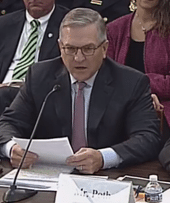FirstNet’s Mike Poth (left), NH’s John Stevens. Photos by Leslie Stimson, Inside Towers.
As the December 28 deadline draws near for states to decide whether to opt-in or out of the First Responder Network Authority (FirstNet), just under half of the states have yet to make a decision. Oklahoma became the 26th state to opt-in yesterday. The questions and options facing undecided states about the financial ramifications of building their own mobile broadband network for first responders have increased and were on full display during yesterday’s hearing of the House Communications and Technology Subcommittee in Washington, D.C. (see related story below “What Happens When a State Opts-In to FirstNet?”)
Rep. Mike Doyle (D-PA) said, “A lot of hay has been made recently about the opt-out process” and “states seeking to opt-out seem overwhelmed” by the process. “The risks to opt-out are steep,” he said during the FirstNet oversight hearing.
FirstNet CEO Mike Poth assured lawmakers there is no penalty or fee assessed to states that choose to opt-out of the network and build their own Radio Access Network (RAN) that must be interoperable with the FirstNet/AT&T network. However, if a state does opt-out and go with a different provider, and its network fails, the state could be liable for replacement costs.
Rep. Anna Eshoo (D-CA) said California was quoted a figure of $15 billion if that happens. Poth said that was an estimate, if California opted out and its own RAN failed. The estimate could be that high, he explained, if “we had to constitute the network from zero.” He said real costs are unknown for replacement networks in the event of a state’s own network failure.
“If they opt-out, we will do anything we can to make them successful,” said Poth. “Twenty-five years is a long time, he said, referring to the life of the contract with AT&T. States that opt-out are also required to construct, operate and maintain their own networks for 25 years. “This is a complex project. We will work with states whether they opt-in or out for 25 years, but opting out makes it more complicated.”
New Hampshire is the only state that has two plans to consider, because it felt the decision timeline given by FirstNet was “unrealistic,” said John Stevens, New Hampshire Statewide Interoperability Coordinator. The original coverage map provided by AT&T left out the northern part of the state, and “AT&T will only negotiate pricing when a state opts-in,” he said. For all those reasons combined, New Hampshire also has a proposal from FirstNet rival Rivada Networks. The state felt that was “superior” to the AT&T plan because of coverage and price. Subsequent talks with AT&T have been “constructive” he added.
“It’s unclear to us why FirstNet and AT&T would make the opt-out decision so onerous and difficult,” said Stevens, who added, “We feel threatened by policy and procedure.” He was clear the state hasn’t made a decision yet whether to opt-in or out of FirstNet, but felt it was best to have another choice.
For the most part, the hearing was cordial. Things turned serious when AT&T SVP Chris Sambar was asked if he had any response to reported recent comments from Verizon that called the FirstNet/AT&T contract a “spectrum deal,” a reference to the fact that some of the spectrum being used for the network comes from the states. Saying, “I personally take exception to this,” the former naval officer emphasized: “This is not a spectrum deal. And it’s not the right way to talk about this. This is for first responders.”
By Leslie Stimson, Washington Bureau Chief, Inside Towers
November 2, 2017






Reader Interactions